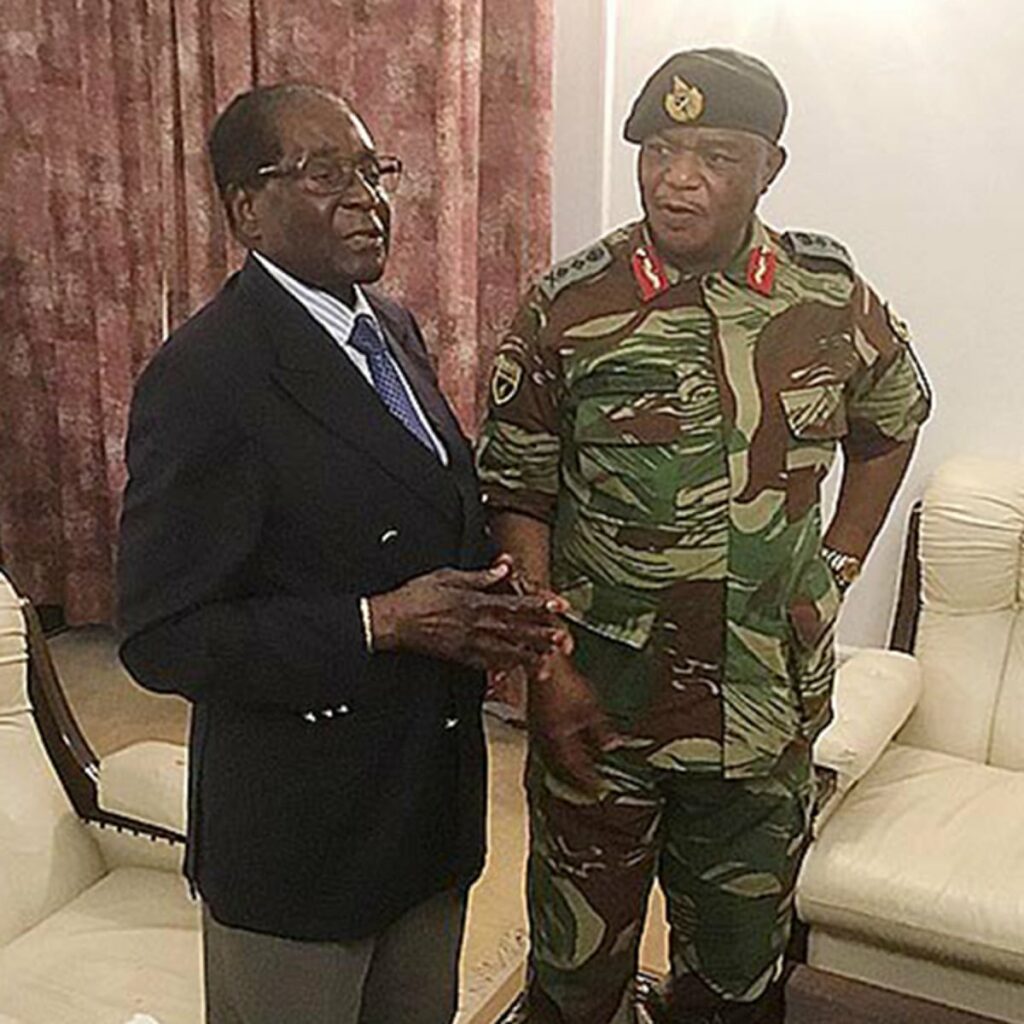Zimbabwe military remains single decisive factor in politics

Rtd-General Chiwenga telling former and late President Robert Mugabe to resign
The opprobrium that characterised the rebuke of remarks made by Chief Murinye by the Vice President of Zimbabwe, Dr Constantino Chiwenga exemplifies the reality around the power matrix in Zimbabwe.
The Vice President was forthright in his rebuke, reading the riot act to the gathered chiefs and indicating who indeed calls the shorts insofar as the power puzzle in Zimbabwe is concerned.
This monologue shall not in any way attempt to take a deep dive into the politics behind the political dynamics especially around Zanu-PF politics but essentially shall attempt to locate the pivot of power in Zimbabwe’s intricate political web.
It is beyond any iota of doubt in Zimbabwe that the institution of the military plays a decisive factor in the politics of the country.
Numerous “clever” politicians have attempted to suggest and insinuate about something they call “security sector reform” or “reform of the military” yet history is laden with case innuendoes of where the military in Zimbabwe has decided the trajectory of politics, to a point of reforming the behaviour of political actors.
It is foolhardy for one to resist to note this overt truth, a truth that is so “loud to see” and “big to hear”, if ever English words can be played around in such a fashion, just to prove how this institution plays a central role in the politics of the country.
The Zvinavashe Doctrine, pronounced in early 2000 (which begins with words, “We want to make it abundantly clear that the military will not salute anyone without liberation credentials”) shows a decisive inclination in values and prove the unbridled fact that the military in Zimbabwe at least thus far, is, and remains, the single most important institution insofar as the statecraft of the country is concerned.
A dedicated attempt at revisionism was tried and collapsed in spectacular fashion in November 2017 as was noted by events that proved that the remarks by founding Prime Minister of Zimbabwe, Robert Gabriel Mugabe, that “the politics leads the gun” was just a mirage of epic proportions.
Definitely, the “human rights and democracy” brigade will tend to look at my characterisations herein as being “undemocratic” and the usual yada but what is of pragmatic importance is the fact that I am looking at history and how it has been defined by the military in this country.
This country can even be traced back to the time of the Rozvi State or even events post-Mfecane in the Zulu State there before the migration by Mzilikazi into modern-day Zimbabwe.
The Pioneer Column had to be conceived to compel sons and daughters of the soil to capitulate to the whims and caprices of the British Colonial company, British South Africa Company. The Anglo-Ndebele and the First Chimurenga Wars were military escapades that sought to define who held the political gravitas to control the land between the Zambezi and the Limpopo rivers.
Take for instance, the Rhodesian setup. Ian Smith depended upon supremacist elements within the Rhodesian security system, primarily the military, who promised him that a war of attrition against the Maoist-trained liberation war fighters was going to be enough to guarantee the longevity of the Rhodesian Utopian idea and as such Smith fallacious idea, that “there shall never be black majority rule in Rhodesia, not in a thousand years!”
Events on the ground proved that indeed, Smith together with his extremist ceremonial presidents that included Clifford Dupont before his demise, believed in the supremacy of the Rhodesian military might. This belief in the supremacy of the military has seen subsequent generations of Zimbabwean leaders putting faith and trust in this extremely important national institution.
This is the same with what we we have in the US, though the Americans pretend to be clever homo sapien sapiens by misinforming and misleading that it is something they call democracy that reigns supreme instead of aspirations of the Pentagon yet it does not need expertise in decoding complex algorithms to observe that the US military infrastructure decides what the dudes at White House announce as foreign policy at each and every four year cycle.
Politics of the modern era is punctuated by chicanery, subterfuge and gross deceit. Machiavellian scheming reigns supreme whilst the art of “winning without fighting” as recommended by Sun Tzu still remains valid to this day.
The institution of the Chiefs in Zimbabwe, itself already punctuated by lack of cohesion as was depicted by cacophony of voices that emanated from different angles post-pronouncements by Chief Murinye and subsequent rebuttal by VP Chiwenga, is subordinated to the whims and caprices of politicians.
This is a painful reality that numerous observers have attempted to skirt around. The fact that Chief Fortune Charumbira distanced himself from remarks made by Chief Murinye proves that some behind the scene shenanigans or, essentially, outright rogue posturing is rampant within that institution.
One thing must be made clear to all and sundry; hate them or like them, these politicians of ours are ahead of our time and he, whose ideals and values resonate with the aspirations of the military, is guaranteed to be at the helm of leadership of this country. Definitely, watchers are now waiting to notice and evaluate how Chief Murinye is going to wean himself off this potential zugzwang scenario but one thing is clear, it no longer is business as usual.
This minor digression does not take away the crux of this submission which essentially is to the effect that the military remains the single most decisive factor in Zimbabwean politics and remarks by Chief Murinye to have a replication of November 17, 2017 events definitely can and indeed do send shivers to many a political analyst.
–-Sapien is a security and trade expert







